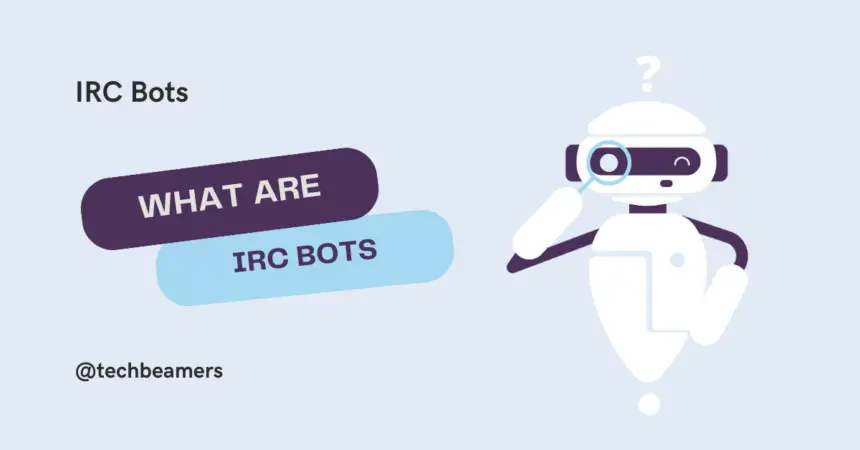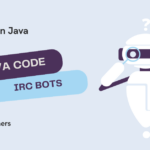Understanding IRC Bots
Internet Relay Chat (IRC) has been a cornerstone of online communication for decades, fostering virtual communities, discussions, and real-time exchanges. Among the various elements that enrich the IRC experience, IRC bots stand out as versatile and powerful tools.
Given that, let’s enter into the world of IRC bots. And, find out what they are, why should we use them, and where and when to deploy them.
What is an IRC Bot?
An IRC bot, a.k.a., Internet Relay Chat bot, is an automated script or program that interacts with users and channels on an IRC network. These bots can perform a wide range of tasks, from simple utilities like managing channel access and providing information to complex operations such as game hosting and data retrieval. At their core, they are designed to assist users and enhance the IRC experience.
Must Read: How to create an IRC bot in Python?
Key Characteristics
In general, it is equally important to know what can these bots do for us.
- Automation: Bots operate autonomously, responding to predefined triggers or commands without human intervention.
- Scriptable: They are typically scriptable in languages like Python, Perl, or JavaScript, allowing for custom functionality.
- Interaction: Bots can communicate with users and other bots using text-based messages.
- Versatility: Their functionality can vary widely, from basic utilities to highly specialized tools.
Why Use IRC Bots?
IRC channels are used for the purpose of communication, collaboration, and information sharing in IRC communities. Let’s explore the key reasons for using them:
1. Automation of Routine Tasks
One of the primary goals of IRC bots is to automate repetitive and mundane tasks. For instance, they can manage channel access permissions, welcome new users, and enforce channel rules. This automation frees up human operators to focus on more critical aspects of community management.
2. Information Retrieval
IRC bots can also fetch real-time information from various sources, such as weather forecasts, news updates, or stock prices. Moreover, the users can request specific data, and the bot delivers it instantly, enhancing the overall user experience.
3. Games and Entertainment
They are often employed to host games, quizzes, and interactive activities within channels. These bots add an element of fun and engagement to the community, fostering a sense of camaraderie among users.
4. Customization and Personalization
Users can customize bots to suit their preferences. Bots can be tailored to deliver specific content or services, creating a personalized experience for each user or channel.
5. Channel Management
In larger IRC communities, channel management can be challenging. IRC bots assist by moderating discussions, kicking or banning disruptive users, and maintaining channel logs.
6. Notifications and Alerts
In contrast, bots can be programmed to monitor specific events or keywords and provide notifications or alerts when these events occur. This is particularly useful for tracking discussions or mentions related to specific topics.
Also Read: A simple IRC bot in Java
Where and When to Use IRC Bots?
They are useful in various scenarios, depending on the needs of the IRC community. Here are common situations where they can be beneficial:
1. Community and Support Channels
In online communities and support channels, bots can greet new users, provide links to FAQs, and answer common questions. They create a welcoming atmosphere and ensure that users receive the information they need promptly.
2. Gaming and Entertainment
Many IRC channels dedicated to gaming and entertainment employ bots to host trivia games, quizzes, and other interactive activities. These bots enhance user engagement and make the channel more enjoyable.
3. Technical Assistance
In technical channels, bots can offer programming assistance, syntax checks, and code compilation. Users can request code examples or documentation references, and the bot provides relevant information.
4. Information Dissemination
News and information channels benefit from bots that deliver real-time updates, weather forecasts, or stock market data. These bots ensure that users stay informed within the channel’s niche.
5. Channel Moderation
Channels with a high volume of users often rely on bots to enforce rules, handle user moderation, and maintain logs. Bots assist in maintaining order and ensuring that discussions remain civil.
6. Notification Services
Bots are useful for monitoring specific keywords or events, such as mentions of a particular topic or keywords related to network status. When these events occur, the bot can send notifications or alerts to relevant users or channels.
7. Data Retrieval
Bots can fetch data from external sources, databases, or APIs. They are invaluable for retrieving data, statistics, or information that users may need during discussions or research.
Choosing or Developing an IRC Bot
When considering an IRC bot, you have two options: using an existing bot or creating a custom one. Several open-source frameworks are available, making it relatively easy to set up a basic bot. However, if your needs are highly specialized, you may choose to develop a custom bot tailored to your requirements.
Popular IRC Bot Frameworks
- Eggdrop: A versatile and widely used IRC bot with a scripting engine for customization.
- Supybot: Known for its extensibility, Supybot (now Limnoria) allows users to add plugins and customize behavior easily.
- Pynfo: A Python-based IRC bot framework suitable for custom bot development.
- IrssiBot: Designed for use with the Irssi IRC client, this bot offers simplicity and efficiency.
- Phenny: A Python IRC bot that focuses on simplicity and easy extensibility.
Conclusion
In conclusion, IRC bots are powerful and flexible tools that significantly enhance the IRC experience. Whether you need assistance with channel management, want to create engaging activities, or require real-time information delivery, they are valuable assets for the community.
Understanding their potential and choosing or developing the right bot can greatly enrich your IRC interactions and create vibrant, well-moderated, and engaging online communities.









